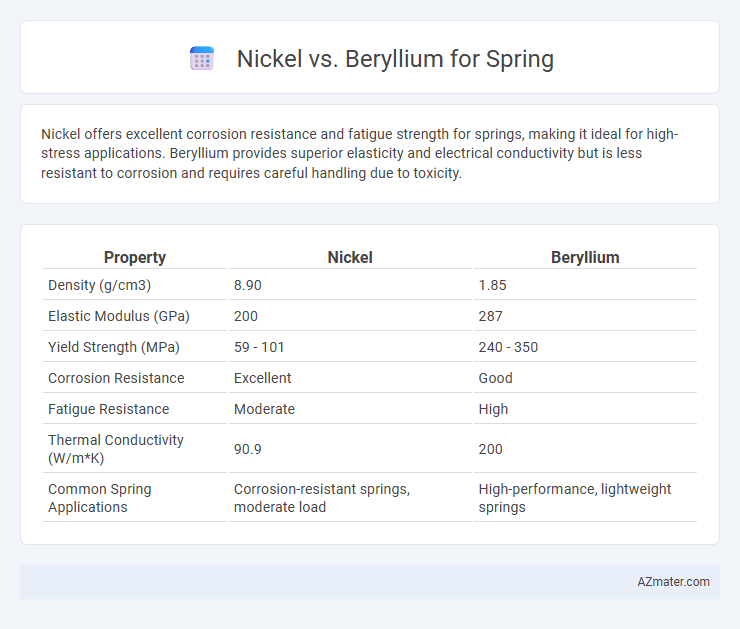Nickel offers excellent corrosion resistance and fatigue strength for springs, making it ideal for high-stress applications. Beryllium provides superior elasticity and electrical conductivity but is less resistant to corrosion and requires careful handling due to toxicity.
Table of Comparison
| Property | Nickel | Beryllium |
|---|---|---|
| Density (g/cm3) | 8.90 | 1.85 |
| Elastic Modulus (GPa) | 200 | 287 |
| Yield Strength (MPa) | 59 - 101 | 240 - 350 |
| Corrosion Resistance | Excellent | Good |
| Fatigue Resistance | Moderate | High |
| Thermal Conductivity (W/m*K) | 90.9 | 200 |
| Common Spring Applications | Corrosion-resistant springs, moderate load | High-performance, lightweight springs |
Introduction to Nickel and Beryllium Springs
Nickel springs are known for their excellent corrosion resistance, high strength, and durability in extreme environments, making them ideal for applications requiring reliable performance under stress. Beryllium springs offer superior elasticity, lightweight properties, and exceptional fatigue resistance, which enhances precision in sensitive mechanical and electronic components. Comparing these materials highlights nickel's robustness and beryllium's enhanced flexibility, guiding material selection based on strength and elasticity requirements.
Material Properties Comparison
Nickel offers superior corrosion resistance and excellent fatigue strength, making it ideal for springs exposed to harsh environments and repeated stress cycles. Beryllium boasts exceptional stiffness and high strength-to-weight ratio, which results in lightweight springs with excellent mechanical performance at elevated temperatures. While Nickel provides better ductility and toughness, Beryllium excels in applications requiring minimal weight and high modulus of elasticity.
Mechanical Strength and Durability
Nickel alloys exhibit superior mechanical strength and resistance to fatigue, making them ideal for high-load spring applications where durability is critical. Beryllium copper springs offer excellent elasticity and corrosion resistance but generally have lower tensile strength compared to nickel-based materials. The choice between nickel and beryllium for springs depends on required mechanical performance, with nickel preferred for maximum strength and beryllium copper favored for resilience and electrical conductivity.
Corrosion Resistance in Various Environments
Nickel exhibits superior corrosion resistance compared to beryllium in various environments, including acidic and alkaline conditions, making it more suitable for springs exposed to harsh chemicals. Beryllium, while strong and lightweight, is more susceptible to oxidation and corrosion, especially in moist or chloride-rich environments. Springs made with nickel alloys offer enhanced durability and longer lifespan in corrosive atmospheres commonly encountered in industrial and marine applications.
Weight and Density Differences
Nickel, with a density of approximately 8.90 g/cm3, is significantly heavier than beryllium, which has a density of about 1.85 g/cm3, making beryllium ideal for lightweight spring applications. The lower density of beryllium allows for reduced weight without compromising strength, enhancing performance in precision and aerospace springs. Nickel springs typically provide higher corrosion resistance but at the cost of increased mass, whereas beryllium springs offer superior weight-to-strength ratios critical for weight-sensitive designs.
Cost Analysis: Nickel vs Beryllium
Nickel springs typically cost less than beryllium springs due to the higher availability and lower extraction expenses associated with nickel. Beryllium, despite its superior strength-to-weight ratio and excellent fatigue resistance, commands a premium price driven by its rarity and complex processing requirements. Evaluating total lifecycle cost, nickel offers a more budget-friendly option for applications with moderate performance demands, while beryllium's higher upfront expense may be justified in high-precision, lightweight spring designs.
Electrical and Thermal Conductivity
Nickel offers moderate electrical conductivity around 14 x 10^6 S/m and excellent thermal conductivity approximately 90 W/m*K, making it suitable for springs requiring robust heat dissipation and reasonable electrical performance. Beryllium, with electrical conductivity near 24 x 10^6 S/m and thermal conductivity about 200 W/m*K, outperforms nickel significantly in both properties, providing superior efficiency in electrically conductive and thermally demanding spring applications. Selecting beryllium springs benefits high-performance electronics and aerospace sectors, whereas nickel springs are preferred in corrosion-resistant environments with moderate conductivity needs.
Safety and Health Considerations
Nickel used in springs may cause allergic reactions and skin sensitization, requiring careful handling and protective equipment to minimize exposure risks. In contrast, beryllium poses significant health hazards such as chronic beryllium disease and lung cancer due to inhalation of dust or fumes, necessitating stringent industrial hygiene controls and respiratory protection. Both metals demand rigorous safety protocols, but beryllium's toxicity and carcinogenicity make it critical to enforce comprehensive exposure limits and monitoring in manufacturing environments.
Applications in Industrial Sectors
Nickel alloys are widely used in industrial springs for high-temperature and corrosion-resistant applications in aerospace, automotive, and chemical processing sectors. Beryllium copper springs offer exceptional electrical conductivity, non-magnetic properties, and fatigue resistance, making them ideal for electronics, telecommunications, and precision instruments. Both materials provide unique mechanical and physical advantages tailored to specific industrial demands, with nickel excelling in harsh environments and beryllium suited for high-performance electrical and mechanical applications.
Choosing the Right Material for Spring Design
Nickel alloys provide superior corrosion resistance and high strength, making them ideal for springs exposed to harsh environments and elevated temperatures. Beryllium copper offers excellent electrical conductivity, fatigue resistance, and non-magnetic properties, which are critical for precision electronic and aerospace spring applications. Selecting the right material depends on balancing mechanical requirements, environmental factors, and cost considerations specific to spring design performance.

Infographic: Nickel vs Beryllium for Spring
 azmater.com
azmater.com